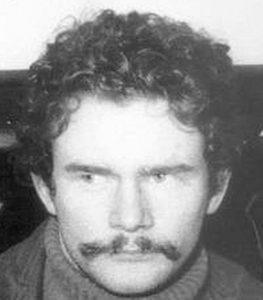July 4, 2023 – Update on the Rose Dugdale criminal saga
English heiress who was involved in failed IRA helicopter-bomb plot ‘estranged from family’
June 30, 2022:
These two articles from the ‘Belfast Telegraph’ highlight the abominable and hypocritical character of the leading figures within the Sinn Fein/IRA movement. They were lauded as ‘peace-makers’ and heralded as leaders to be followed, when in truth they were amongst greatest murderers and criminals in Ireland, north and south.
The Democratic Unionist Party is guilty of helping to spread the lie regarding Martin McGuinness, who was a cold-blooded mastermind of murder, when they entered a power-sharing arrangement with Sinn Fein/IRA which resulted in him being appointed as Deputy First Minister in Stormont back in 2007.
The curse of God has been upon the Unionist cause ever since the endorsement that arrangement received from the Unionist people!
The Bible declares the fate of such as these two:
“But the fearful, and unbelieving, and the abominable, and murderers, and whoremongers, and sorcerers, and idolaters, and all liars, shall have their part in the lake which burneth with fire and brimstone: which is the second death,” Revelation 21:8.
Being the subject of innumerable republican hero-worshipping ballads will not spare them from this terrible fate.
Sincere regards,
Ivan Foster

Former IRA man claims Martin McGuinness supplied car used for Co Fermanagh bombing
Part-time UDR soldier was targeted in 1972, claims new book
‘Belfast Telegraph’, June 27 2022 09:59 PM
A former IRA member has claimed that Martin McGuinness supplied a car used to bomb a garage along the border in 1972.
The details have been disclosed by Eddie Gallagher, who had been an IRA member from Donegal.
He made the claims in a new book by Sean O’Driscoll — ‘Heiress, Rebel, Vigilante, Bomber’ — which tells the story of London heiress turned IRA member Rose Dugdale.
Gallagher met Dugdale during the 1970s and they would go on to have a son, to whom McGuinness became godfather.

O’Driscoll’s book has claimed that Dugdale herself was involved in the making of explosives used in several high-profile IRA bombings.
In the book, Gallagher recalls his attempts in 1972 to kill a part-time Ulster Defence Regiment soldier named Mervyn Johnston, a mechanic who specialised in fixing Minis, his garage was in the village of Pettigo and just on the Co Fermanagh side of the border.
Multiple murder attempts were made, including shooting at Mr Johnston at a customs post as well as leaving a number of incendiary bombs at his garage.
With the possibility of an imminent IRA ceasefire, a frustrated Gallagher decided if he couldn’t kill Mr Johnston he would at least destroy his business.
On July 21, 1972, Gallagher planted the bomb along with two other IRA members.
“We decided to put a car bomb in his garage and destroy his business, so we went up early one morning,” he is quoted in the book.
“It was the first thing that Martin McGuinness was involved in with us: he gave us the car for the car bomb.”
At the time, McGuinness had been an IRA commander in Londonderry before he would eventually enter politics and serve as deputy First Minister.
Gallagher continued: “We put it in there (the garage), with an hour’s timer as usual, and we headed back off to Donegal.”
He later stopped in Donegal town to try and call in a bomb warning, but was stopped by a Garda patrol before he could get through. The IRA members warned a Garda sergeant, who quickly gave the order to clear Main Street in Pettigo, with RUC members doing the same. The explosion destroyed the garage on the Northern Ireland side, but as Gallagher and the other two IRA members were arrested over the border they were charged with lesser crimes.
At the time there was no extradition treaty in place between the UK and the Republic of Ireland.
Gallagher met Dugdale at a later point in England, and she is said to have joined him in Pettigo in 1973 to take part in a small IRA training camp.
The pair would later collaborate on the 1974 bombing of a police station in Strabane using a hijacked helicopter.
Last week, a group representing victims of the Troubles called on police to investigate claims of Rose Dugdale’s IRA activity.
Now aged 80 and living in Dublin, Dugdale has previously served nine years in prison for stealing art used to try and fund the escape of IRA prisoners.
Sean O’Driscoll’s book claims she was involved in developing bomb-making techniques used in several IRA attacks.
These are said to include an attack on the Baltic Exchange in 1992, which killed three people, and the London Docklands bomb in 1996, which left another two dead.
‘Belfast Telegraph’ – June 27 2022

A group representing victims of the Troubles has called for an investigation into new claims that a London heiress who joined the IRA was behind a series of high-profile bombings.
Rose Dugdale (80) is the subject of Seán O’Driscoll’s book Heiress, Rebel, Vigilante, Bomber. She has previously served nine years in prison for stealing art used to try and fund the escape of IRA prisoners.
It is now alleged that after growing up as the daughter of a London millionaire, she was involved in developing bomb-making techniques used in several IRA attacks during the Troubles.
The book is based on interviews with Dugdale, who currently lives in Dublin, and others, and for the first time it’s suggested that she had a key role in developing the IRA’s bomb-making capability.
Her methods are said to have been used in an attack on the Baltic Exchange in 1992, which killed three people, and in the London Docklands bomb in 1996, which left another two dead.
Dugdale’s techniques were also said to have been used in a massive 2,500lb bomb in a 1991 attack on Glenanne barracks, Co Armagh, that killed three soldiers.
Reacting to the claims, Kenny Donaldson of Innocent Victims United, has called for her immediate arrest. “The reported confessions Rose Dugdale has made within this new book demand that she be immediately arrested,” he said.
“Here we have in black and white someone allegedly confirming their involvement in the making of bombs which led to the murders of people, security forces and civilians,” he said.
He also voiced concerns about legislation on the legacy of the Troubles currently going through Westminster.
He said if immunity was granted in exchange for information, then terrorists would then be “emboldened to wax lyrical” about their involvement in violence, which would be painted as “some form of romanticised resistance against tyranny”.
“These types of offerings do nothing other than dance on the graves of innocent victims; it is abhorrent and such practice must cease,” he said.
However, the author said last night he “did everything I possibly could to keep it balanced” and found it “frustrating” of being accused of romanticising violence after striving to include the stories of IRA victims.
Sean O’Driscoll said what he was reporting may actually be of use to victims, bringing to light information that may otherwise never have been made known.
Urging his critics to read the book first, Mr O’Driscoll said: “I feel that if loyalists and republicans are attacking me, I must be doing something right.”
And he added that “coercing a million outraged Protestants into a Catholic-majority state always seemed like an exercise in futility”.
A PSNI spokesperson said: “Police have not examined the content of the book referred to; however detectives will always pursue any credible evidence of criminal offences.”
A spokesperson for An Garda Síochána said that it “takes the concerns of all victims seriously and seeks to ensure all victims are treated with dignity and respect.
“An Garda Síochána does not comment on remarks by third parties or on the specifics of investigations conducted by other parties,” they said.
“It is also the policy of An Garda Síochána not to make detailed public comment on police investigations conducted in other jurisdictions.
“Specific enquiries in relation to the investigation into the 1996 London Docklands bombing should be directed to the Metropolitan Police.”
The Metropolitan Police have also being contacted for a response.
